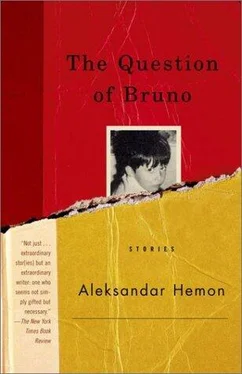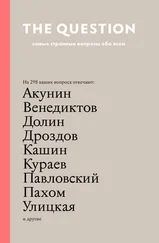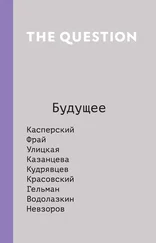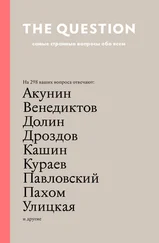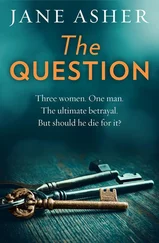My mother walked back in.
“I was just asking your boy, madam, what does he want to be in his life: What do you want to be, young man?”
“A journalist,” I said.
“Smart, very smart. You’re going to get very far, my boy. Madam, if you’d show me where your husband keeps his private stuff, I’d be thankful beyond words. No? Well, then I’ll just look around, if you don’t mind.”
He got up and paced around the dining room, pulled out a couple of books from the shelf, flipped through them detachedly, and put them back. He turned toward us, smiled, said: “Pardon me,” and slipped into the bedroom.
Mother and I heard noises coming from the bedroom: thumping of suitcases, a screech of a drawer, a snap of a locked drawer, din of sundry things being thrown on the floor. Mother held my hand, squeezing it — her hand, moist and faint. Slobodan walked out with a suitcase, shoving something into his pocket. He produced a little box (with a painted bee landing on a flower) out of his hand and said: “Condoms, my boy. Had your father had this on, you would have rotted, stuck in a sewage pipe, years ago.” My mother plucked the box out of his hand and said: “Get out!”
“If you wish to talk to me, feel free to call me. My boss always says that love has political limits. 30Please, call me.” He wrote the phone number on the wall by the front door: 71–782, then opened the door and walked out. Before my mother closed the door, he shouted in the echoing hall: “We should get together sometime, now that you’re alone.”
Mother reluctantly opened the bedroom door: an open suitcase; a pile of suits (hanger-hooks looking like bowed swan heads); the Sputnik glass shattered, pens and pencils scattered around, like corpses. On the bed, there were two symmetrical foot-shaped dents, and mounted ripples on the bedspread around them.
After a month or so, Hanna and I went with our mother to visit Father in jail. The visiting room looked like a decrepit hotel hall, with stained and torn sofas and armchairs sorted into separate throngs. Father came followed by a guard 31in a wan blue uniform (the rim of his cap touching the top of his eyebrows). Mother immediately burst into tears and hugged Father. He sat down between Hanna (“Tata! Tata!”) and me, putting his arms around us (thin, bloody wristlets). The tip of his left eyetooth was broken and under his left ear, at the root of the jaw, there was a huge bruise, as if a shadow of the ear.
“I’ve done nothing wrong,” he said.
“Shut your fucking mouth!” roared the guard.
“Did they torture 32you?” Mother asked.
“A slap or two.”
“Shut your fucking mouth!”
“How’s your school?” Father asked me.
“Fine.”
“He got the best grade in the class 33on the history test.”
“Good,” he said. “Good.”
“What do they want from you?” Mother asked. “They’re interrogating me. They want me to sign a statement.” 34
“Shut your big fucking mouth! This is the last time I’m telling you.”
Father was sentenced, after a brief (closed to the public) trial, to three years of hard labor and was shipped off to the Zenica prison on January 7, 1978. There was footage shown on TV of my father (and four obscure men) in the courtroom handcuffed, as the voice-over spoke about “disseminating foreign propaganda,” about “the internal enemy who never sleeps,” about “Tito and his vision,” about “protecting what our fathers bled for.”
“We have seen it before,” the voice said. “And we’ll see it again: dissembling intellectuals, spreading dissent like a lethal germ. But this is what we have to tell them: stay away from the clear stream of our progress or we’ll crush you like snails!” 35
The years of Father’s imprisonment passed uneventfully: my sister was growing, learning to speak, learning to be sad; my mother became reticent; and I was going through all those adolescent things: the deepening of the voice, rebelling, reading (The Stranger, The Trial, The Metamorphosis); falling in love (a Nina, until her father forbade her seeing me). But I participated in all this half-heartedly, as if it were all happening to someone else and I was watching it with languid amazement. No one was visiting us and we were going nowhere. Only Slobodan would call once in a while (“Your father is locked behind walls with desperate men, my boy, and your mother needs all the support she can get”). Once a month, we’d go to see Father. We’d sit on the bench in the prison yard, even in the winter, exchanging petty information about our walled-off lives, too aware of the gaze of the remote guards and the sharpshooter in the watchtower. In the spring of 1979, Mother and Father sat on the bench, for two hours, mainly mute, while I was catching stray butterflies for Hanna, and morose prisoners, staring at each other’s napes, revolved around a guard (chanting: “Left-right! Left-right!”). When we came back home (after a two-hour ride in a bus full of drunken, vomiting soldiers) Mother burst into tears while unbuttoning her (black) shirt, sat on the chair and wept for hours, ignoring my repeated questions, pushing me away.
In September 1979, I wrote my first poem, 36in less than an hour, as if hallucinating. The poem was entitled “The Loneliest Man in the World.” It was about Sorge and it was more vicarious self-pitying than anything else. I’m translating it (in fact, only the first of ten tedious stanzas) from memory, for I annihilated the notebook (with other, much less memorable, poems) at the peak of the campaign of self-loathing and destruction 37(which also included shaving every single hair on my body) in my late teens:
Tokyo is breathing and I am not,
The curtain of rain glued to my face.
I don’t live a life, I live a plot,
Having two selves in one place etc.
I wanted to show it to my father, next time we went to visit him, but he was ill and he only wanted to know about the Afghanistan events 38(political prisoners could not watch the news). This time we met him in a miasmic room, with a small window looking at the women’s prison. He was escorted by a guard, whom he nicknamed “Barabas,” and who would help him get up or walk (“You can put me back on the cross now, Barabas”). The prison uniform was dangling from his now scrawny shoulders. “I shrank,” he said.
In January 1980, Father was released from prison, diagnosed with brain cancer, curled into an old man, with most of his teeth missing. He could wear my clothes, and the wedding ring was sliding down his finger — he took it off. We rearranged our place and put the TV in the bedroom, Father taking hold of the remote for the rest of his life. He’d watch TV (mainly the news) all day, sucking a banana, occasionally passing out and then waking up from listless dreams. On his good days, he’d be drinking strong-scented tea 39and tell us stories about his USSR journeys: about Ukrainian weddings, everybody dancing kolomiyka like there was no tomorrow; about nuclear submarines that could stay for days under water (crews going blind); about riding camels in Kazakhstan; about wheat fields spreading as far as you could see and beyond. Every day, he was getting smaller and smaller, as if flesh was being squeezed out of him like toothpaste.
On May 4, Comrade Tito died. He had been ailing for a long time and they had had to amputate his leg. We were, for days, repeatedly shown footage of (monopedic) Comrade Tito smiling, surrounded by glowing doctors (happier than anyone that he was alive), a wrinkleless sheet covering his retained leg. Sirens began wailing at 15:04. I looked through the window and saw everything still: people stood motionless on the street, cars were paralyzed, as if someone had stopped the film in the projector. On the black TV screen white letters emitted: “Comrade Tito has passed away”—no voice-over, no images shown. Sirens stopped wailing. I looked at the street and everybody and everything was gone, as if the ground had gaped open and swallowed it all. 40I suppose this is Judgment Day,” my father said and turned off the TV. “I suppose this is the end of it all.”
Читать дальше
